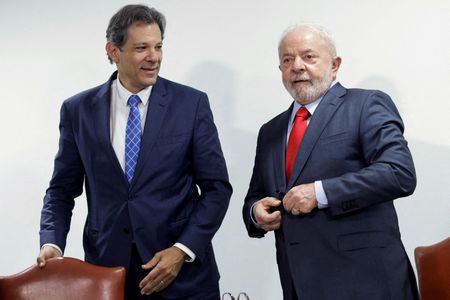By Marcela Ayres
BRASILIA (Reuters) -Brazil’s finance ministry unveiled on Thursday a proposal for new fiscal rules to balance limits on spending growth with the government’s vow to boost social programs and public investment, lifting local markets after months of uncertainty.
The long-awaited proposal is key to easing fiscal concerns after leftist President Luiz Inacio Lula da Silva secured congressional approval to bypass a constitutional spending cap. His spending vows and criticism of the central bank have pushed up inflation expectations since he took office in January.
The new fiscal framework proposed in the finance ministry presentation on Thursday combines a looser spending cap with primary budget targets, as reported by Reuters on Wednesday.
Brazil’s benchmark stock index rose 1.5% and its currency firmed slightly against the U.S. dollar to a nearly two-month high as analysts greeted the proposal with measured relief, highlighting questions about its details and execution.
The new rules would allow public spending to grow between 0.6% and 2.5% per year above inflation. Spending growth would also be limited to 70% of revenue growth in the prior 12 months.
The new framework, which Finance Minister Fernando Haddad said will be submitted to Congress next week, would replace the constitutional prohibition on spending increases above inflation since 2017. Brazil has allowed repeated exceptions to that rule in recent years, undermining its credibility with investors.
The commitments to erase a budget deficit next year and deliver a primary surplus in 2024 are encouraging, said Todd Martinez, a director of sovereign analysis at Fitch Ratings.
“If that really happens, it’s good news,” he said in an interview, adding that the credibility of those targets will depend on what policy measures will be taken to achieve them.
“Although the governments’ forecasts are positive, they are also very optimistic and raise questions about execution,” wrote Rafaela Vitoria, chief economist at Banco Inter.
Haddad said the finance ministry had discussed the proposal with the central bank and other ministries, reaching “100% consensus” within the government after weeks of reported tensions between him and more leftist aides to the president.
‘HARMONIZING’ POLICY
In an olive branch to central bank President Roberto Campos Neto, Haddad told journalists at a news conference that Brazil would grow only by “harmonizing” fiscal and monetary policy.
Lula has criticized Campos Neto repeatedly for the central bank keeping interest rates at a six-year high due to rising inflation expectations and doubts about fiscal policy.
In a separate news conference, Campos Neto told journalists he still had not seen the details of the new fiscal framework, but the early proposals he heard seemed “quite reasonable.”
As Reuters reported on Wednesday, the new framework would also target zero primary deficit in 2024, followed by a primary surplus equal to 0.5% of GDP in 2025 and 1% of GDP in 2026. The primary budget target would have a margin of plus or minus 0.25 percentage point.
This year’s primary deficit target, the first of the Lula administration, is 228.1 billion reais ($44 billion). However, the finance ministry said on Thursday it will seek a primary deficit equal to 0.5% of GDP, following its recent estimation that the shortfall would be 107.6 billion reais, equal to 1.0% of GDP, helped by a jump in expected tax revenue.
Under the finance ministry’s base scenario, the new fiscal rules would help to stabilize gross public debt around 76% of GDP in 2026, compared with 73% in January, said Treasury Secretary Rogerio Ceron.
The government’s proposed fiscal rules would also set a floor for public investments. Ceron told journalists that investments which currently total around 70 billion-75 billion reais would be corrected for inflation over time.
(Reporting by Marcela Ayres in BrasiliaAdditional reporting by Fabricio de Castro in Sao Paulo, Isabel Versiani in Brasilia and Libby George in LondonEditing by Brad Haynes and Matthew Lewis)





